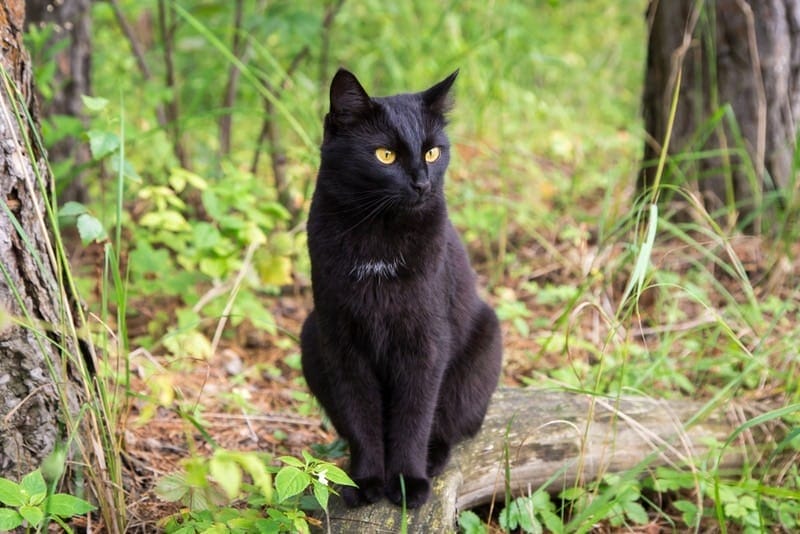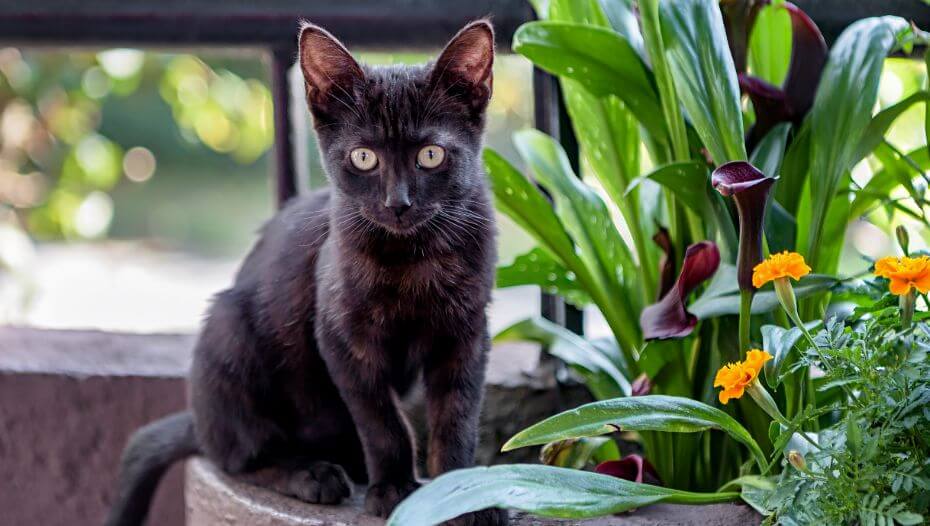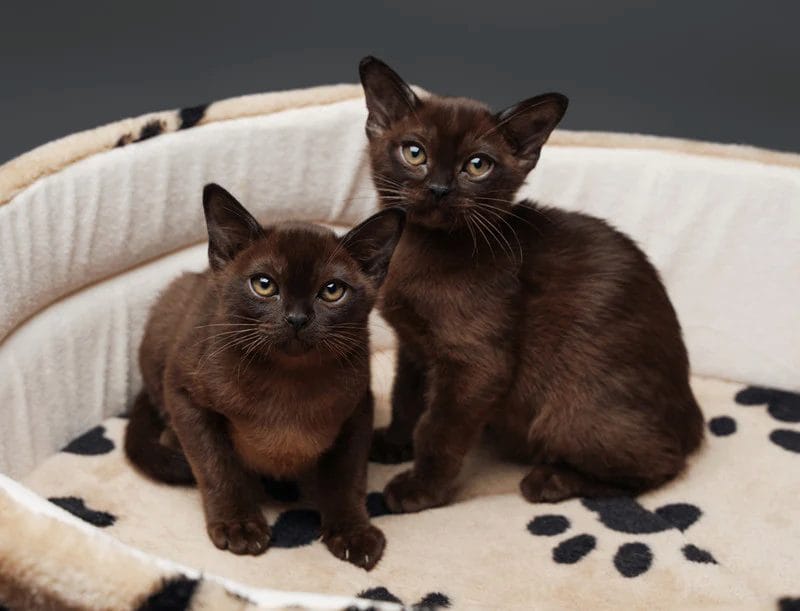The Bombay cat breed is a relatively new breed that looks like a mini black panther. With its sleek, jet black coat, vibrant copper eyes, and muscular build, the Bombay has an exotic appearance unlike any other feline. But what is this breed really like? Here’s a complete guide to Bombay cat traits and how to care for these eye-catching felines.
Introduction The Bombay Cat Breed
The Bombay cat originated in the 1950s when a breeder crossed a black American Shorthair with a Burmese to produce a cat that resembled a miniature black panther. The result was a medium-sized cat with a striking, gleaming black coat and vibrant copper eyes. Bombay cats are playful, affectionate, and enjoy being around people. They form strong bonds with their families and crave attention. With their exotic panther-like looks and lively personalities, it’s no wonder Bombay cats have steadily grown in popularity over the years.

Affectionate with Family: ⭐⭐⭐⭐
Amount of Shedding: ⭐
General Health: ⭐⭐⭐
Potential for Playfulness: ⭐⭐⭐⭐
Tendency to Vocalize: ⭐⭐
Kid-Friendly: ⭐⭐⭐
Friendly Toward Strangers: ⭐⭐
Easy to Groom: ⭐⭐⭐⭐
Intelligence: ⭐⭐⭐
Pet Friendly: ⭐⭐
- Appearance: The Bombay has a medium-sized muscular body with a short, satin-like black coat and vibrant copper eyes. Their sleek panther-like look is enhanced by the patent leather shine of their fur.
- Characteristics: Bombays are playful, affectionate, and enjoy being around people. They form strong bonds with their families and crave attention and playtime. Bombays are also highly intelligent and easy to train.
- Popularity: Since being recognized as a breed in the 1970s, the Bombay has steadily grown in popularity for its exotic looks and lively, people-oriented personality.
- Temperament: Bombays have outgoing, friendly personalities. They tend to bond closely with their families and are highly affectionate. Bombays are also energetic, playful, and intelligent.
- Lifespan: 12-16 years
- Coat Color: Bombay cats have a gleaming, jet black coat. Kittens are born black or slightly brownish, becoming more black as they mature.
- Origins: The Bombay cat is a cross between the American Shorthair and Burmese breeds. It’s considered a hybrid or designed breed.
How to Care for a Bombay Cat Breed
Food:
- High-quality cat food with protein from meat: Bombays need a nutritious diet with adequate protein from meat sources like chicken, turkey, or fish to maintain their sleek muscular build.
- Wet and dry food: Feed your Bombay a combination of wet canned food and dry kibble to provide variety and moisture.
- Avoid fish-only diets: While fish is fine as an ingredient, fish-only diets can lead to nutrient imbalances. Rotate proteins.
Environment:
- Cat trees and perches: Bombays love to climb and need vertical spaces like cat trees, perches, and shelving to satisfy their athletic nature.
- Cat-proofing: Their energetic personality means Bombays will leap and bound through your home. Cat-proof breakables and secure windows.
- Attention and playtime: Bombays thrive on interaction and need ample play sessions and quality time with their families. Stock up on interactive toys to keep them engaged.
Grooming:
- Weekly brushing: Use a rubber brush weekly to remove loose fur from your Bombay’s satin coat. More frequent brushing can reduce shedding and hairballs.
- Nail trimming: Trim nails every 2-3 weeks to avoid snags and scratches.
- Ear cleaning: Check and wipe ears weekly to prevent waxy buildup.

Caring for Bombays:
Bombays need lots of affection, attention, and interactive playtime with their families. Make sure to schedule regular play sessions and quality snuggling time to keep your Bombay happy.
How to buy/adopt a Bombay cat
Popular Areas:
- United States: Bombay cats are popular across the United States. Reputable breeders can be found in most states. Adoptable Bombays can be found through breed-specific rescues nationwide.
- United Kingdom: The Bombay is a recognized and registered breed with the Governing Council of the Cat Fancy in the UK. Bombays can be found from reputable British breeders.
- Canada: The Bombay breed has an established presence in Canada. Bombays are available from Canadian breeders and rescues.
Average Price:
$600 – $1500 USD. Bombay kittens from registered breeders typically cost $1000+ while adult Bombays are often less. Adoption fees for Bombays from rescues and shelters are usually under $200.
Bombay Cat Adoption and Rescue:
- Bombay and Exotic Breed Rescue (USA)
- Bombay Cat Club Rescue (USA)
- Purrfect Endings Rescue (USA)
- The Bombay Cat Society Rescue (UK)
What to Ask Breeders:
- General health: Ask if parent cats are tested for genetic diseases common in the breed. Kittens should be vet-checked.
- Vaccination status: Kittens should have age-appropriate vaccines and deworming. Adults should be current on rabies vaccine at minimum.
- Medical history: Breeders should provide health records showing the kitten/cat is in good health.
Preparing for Your Bombay Cat
- Bombay-proof your home by storing breakables securely, adding cat trees/perches, and keeping toilet lids closed (Bombays explore water!).
- Stock up on nutritious cat foods and treats. Bombays need high-protein, meat-based diets. Wet and dry food combinations are ideal.
- Get interactive toys like feather wands, treat balls, and laser pointers to stimulate your Bombay mentally and physically.
- Invest in a good rubber brush and nail clippers for weekly grooming.
- Schedule regular vet visits to keep your Bombay current on vaccines and to spot potential health issues early.
Common Bombay Diseases and Prevention:
- Hypertrophic cardiomyopathy: Can cause heart failure. Have your vet screen for HCM.
- Hip dysplasia: Causes arthritis. Ensure good nutrition and exercise.
- Polyps: Benign growths in ears and airways. Monitor for any signs.

Recommended Vaccines:
- FVRCP: Protects against common feline viruses
- Rabies: Required by law in most jurisdictions
- FeLV: Recommended by some vets for outdoor cats
Naming Your Bombay Cat
Pick a fun, unique name that reflects your Bombay’s panther-like mystique. Bombay owners often choose exotic sounding names, words related to their black coat, or names of places related to India or Asia. Some examples:
- Midnight
- Jett
- India
- Sable
- Panther
- Mystique
- Luna
- Salem
- Raven
- Bagheera
- Siam
- Batman
- Licorice
“Do Bombay cats like going out rather than staying home?”
Bombays generally prefer to stay indoors where they feel safest. They bond very closely with their families and thrive on attention, so the comforts of home suit them best.
“Is a Bombay cat a smart cat?”
Yes, Bombays are highly intelligent and can readily learn tricks and commands. Their energetic nature means they need mental stimulation and benefit from puzzle toys and interactive play.
“How many types of Bombay cats are there?”
There is only one recognized Bombay breed. Bombay refers specifically to black cats of Burmese and American Shorthair ancestry. Breeders are working on new Bombay coat colors like chocolate and lavender.
“How to stop Bombay cat from biting?”
Redirect biting into positive behaviors like playtime. Say “no” firmly and ignore them after biting. Ensure they aren’t biting due to stress or poor socialization.
“How to stop Bombay cat from scratching?”
Trim nails regularly and provide scratching posts. Use cat repellent sprays on off-limit areas. Praise them when they scratch appropriate surfaces.
“How to socialize and raise a friendly Bombay cat?”
Socialize Bombay kittens early and frequently by introducing them to new sights, sounds, people and pets in a calm, positive manner. Reward friendly behavior with treats and praise.
“How to train your Bombay cat?”
Bombays are highly trainable using positive reinforcement. Use clicker training, treats, and consistent commands to teach commands and tricks. Keep sessions short and engaging.
“How often should Bombay cats see the vet?”
Take Bombays to the vet annually and bring them in right away if you notice any health or behavior changes. Senior Bombays 8+ years may need vet visits every 6 months.
“Are Bombay cats good family pets?”
Yes, Bombays make exceptionally loving, playful family pets. They form strong bonds and love interacting with respectful children and cat-friendly dogs.
“Are Bombay cats good with children?”
Bombays tend to adore children and become very attached to kids who treat them kindly. Always supervise young children and teach them how to properly handle cats.
“Are Bombay cats good with other animals?”
Bombays generally coexist well with cat-friendly dogs. They also get along with other cats, especially if raised together from kittenhood. Proper introductions are key for successful multi-pet homes.
“Can Bombay cats cause allergies?”
Bombays produce less Fel D1 protein than other cats, so may be better tolerated. But they can still trigger allergies, so meet the individual cat before adopting.
“Are Bombay cats ferocious?”
No, Bombays have sweet, sociable personalities. Their panther-like appearance is deceiving – Bombays love snuggling with their families. They can play energetically but are gentle cats.
“Do Bombay cats have hair loss problems?”
No, Bombays are not prone to alopecia or excessive shedding. Their short, sleek coats typically grow in uniformly and remain glossy with weekly brushing. Excessive hair loss can signal an underlying medical issue.
Are you a cat lover who wants to learn more about your furry friends? Do you want to find the best cat food, cat care tips, and resources for your cats? If so, you’ve come to the right place! Welcome to Cat Food Site, the ultimate website for cat enthusiast.
Here you will find everything you need to know about cats Breed, from their health and behavior to their breeds, cat diet and names. You will also discover the latest cat news, cat nutrition, trends, and memes from around the web.

